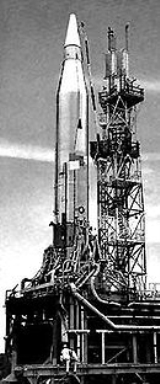
SM-65C Atlas
Encyclopedia
The SM-65C Atlas, or Atlas C was a prototype of the Atlas missile. First flown on 24 December 1958, the Atlas C was the final development version of the Atlas rocket, prior to the operational Atlas D
. It was originally planned to be used as the first stage of the Atlas-Able
rocket, but following an explosion during a static test on 24 September 1959, this was abandoned in favour of the Atlas D.
Six flights were made. These were all sub-orbital test flights of the Atlas as an Intercontinental Ballistic Missile
, with three tests succeeding, and three failing.
All Atlas C launches were conducted from Cape Canaveral Air Force Station
, at Launch Complex 12
.
SM-65D Atlas
The SM-65D Atlas, or Atlas D, was the first operational version of the U.S. Atlas missile. It first flew on April 14, 1959. Atlas D missiles were also used for orbital launches, both with upper stages and on their own as a stage-and-a-half vehicle....
. It was originally planned to be used as the first stage of the Atlas-Able
Atlas-Able
The Atlas-Able was an American expendable launch system derived from the SM-65 Atlas missile. It was a member of the Atlas family of rockets, and was used to launch several Pioneer spacecraft towards the Moon...
rocket, but following an explosion during a static test on 24 September 1959, this was abandoned in favour of the Atlas D.
Six flights were made. These were all sub-orbital test flights of the Atlas as an Intercontinental Ballistic Missile
Intercontinental ballistic missile
An intercontinental ballistic missile is a ballistic missile with a long range typically designed for nuclear weapons delivery...
, with three tests succeeding, and three failing.
All Atlas C launches were conducted from Cape Canaveral Air Force Station
Cape Canaveral Air Force Station
Cape Canaveral Air Force Station is an installation of the United States Air Force Space Command's 45th Space Wing, headquartered at nearby Patrick Air Force Base. Located on Cape Canaveral in the state of Florida, CCAFS is the primary launch head of America's Eastern Range with four launch pads...
, at Launch Complex 12
Cape Canaveral Air Force Station Launch Complex 12
Launch Complex 12 at Cape Canaveral Air Force Station, Florida is a launch pad used by Atlas rockets and missiles between 1958 and 1967. It is the second-most southern of the pads known as missile row, between LC-11 to the south and LC-13 to the north...
.
Launch history
| Date | Time (GMT) | Serial | Apogee | Outcome |
|---|---|---|---|---|
| 3C | 900 kilometres (559.2 mi) | Success | ||
| 4C | 900 kilometres (559.2 mi) | Failure | ||
| 5C | 100 kilometres (62.1 mi) | Failure | ||
| 7C | 200 kilometres (124.3 mi) | Failure | ||
| 8C | 900 kilometres (559.2 mi) | Success | ||
| 11C | 900 kilometres (559.2 mi) | Success | ||

